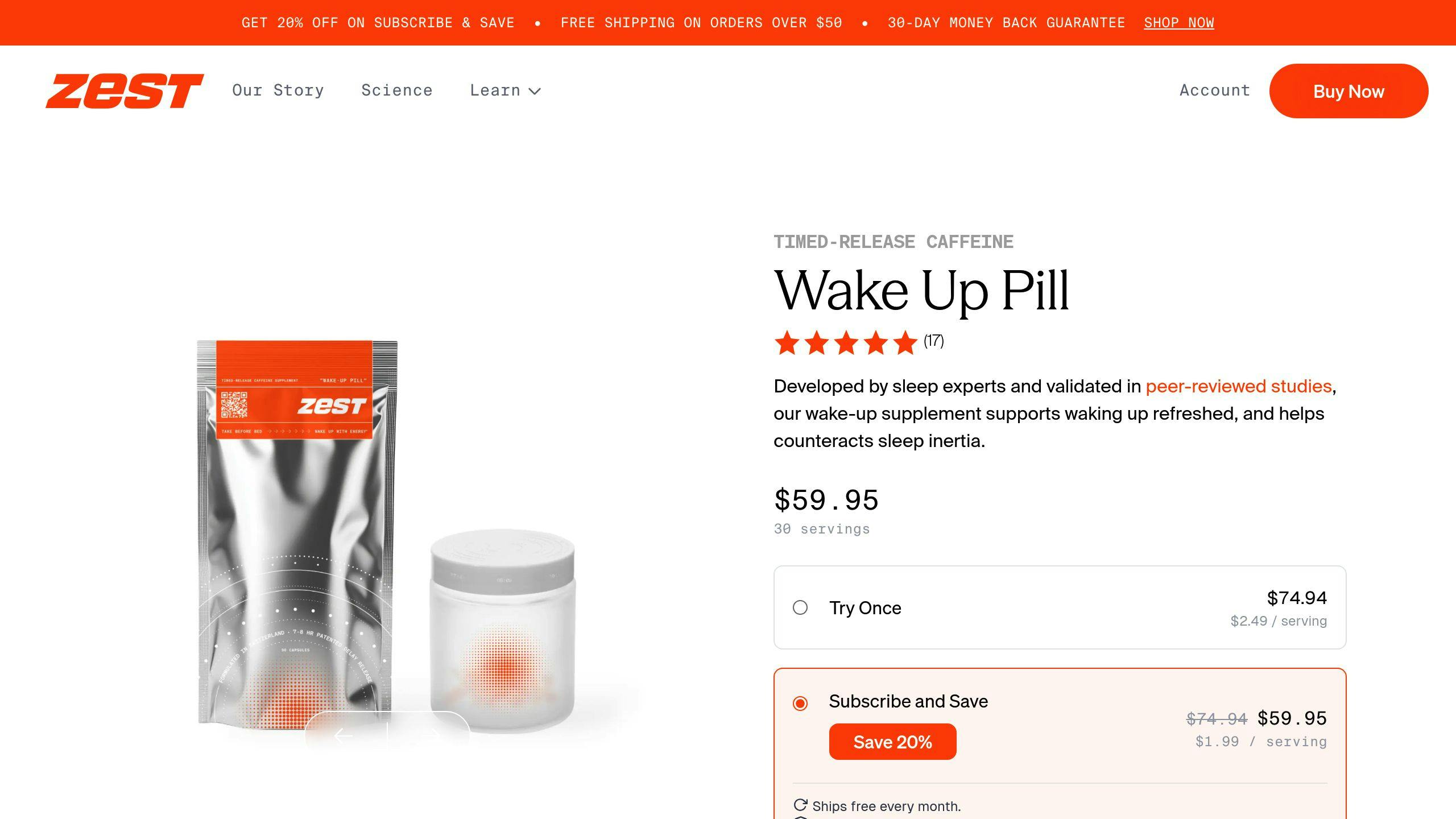The Surprising Factors That Influence How Long Caffeine Stays in Your System
Explore the surprising factors that affect caffeine metabolism, including genetics, diet, and lifestyle, to optimize your energy levels and sleep.

Caffeine affects everyone differently. While its half-life averages 4-5 hours, how long it stays in your system depends on factors like genetics, age, medications, and lifestyle habits. For example, smokers metabolize caffeine almost twice as fast, while pregnancy or liver issues slow it down. Foods like broccoli can speed up caffeine breakdown, but grapefruit juice slows it. Genetic differences in the CYP1A2 enzyme also determine whether you're a fast or slow metabolizer, impacting how caffeine affects your sleep and energy.
Quick Tips:
- Limit caffeine after 2 PM to avoid sleep issues.
- Stick to under 400 mg/day for most adults (200 mg/day if pregnant).
- Consider delayed-release caffeine products for steady energy.
Understanding these factors can help you optimize your caffeine intake for better focus and sleep.
How Caffeine is Processed by the Body
When you take a sip of coffee or an energy drink, your body immediately starts breaking down the caffeine. This process begins in your digestive system, where caffeine is quickly absorbed through the gastrointestinal tract. Within about 45 minutes, nearly all the caffeine you consumed is in your bloodstream.
The Liver's Role in Caffeine Metabolism
The liver plays a central role in breaking down caffeine, using the cytochrome P450 enzyme system. Specifically, the enzyme CYP1A2 is responsible for metabolizing around 95% of the caffeine you consume. During this process, caffeine is broken down into three key compounds:
| Metabolite | Description | Effect |
|---|---|---|
| Paraxanthine | Primary metabolite | Acts similarly to caffeine |
| Theobromine | Secondary metabolite | Provides a mild stimulant effect |
| Theophylline | Secondary metabolite | Helps with breathing |
Certain foods and drinks can influence how efficiently this system works. For example, grapefruit juice can slow down caffeine metabolism, while eating broccoli or other brassica vegetables can speed it up. How well your body processes caffeine largely depends on the activity of the CYP1A2 enzyme, which also determines caffeine's half-life.
How Long Caffeine Stays in Your System
On average, caffeine's half-life is about 4 hours, but this can vary widely depending on individual factors. Genetic differences in the CYP1A2 enzyme play a big role in how quickly caffeine is processed.
"Studies have shown that genetic polymorphisms in the CYP1A2 gene can significantly affect caffeine clearance rates, and regular intake of caffeine can influence CYP1A2 activity".
Other factors also affect caffeine metabolism. Smokers, for instance, process caffeine twice as fast due to higher CYP1A2 activity, while pregnant individuals metabolize it more slowly because of reduced enzyme function.
Factors Affecting Caffeine Metabolism
Genetic Differences in Caffeine Sensitivity
Your genes heavily influence how your body processes caffeine. A specific variation in the CYP1A2 enzyme determines whether you metabolize caffeine quickly or slowly. Here's how it works:
| Metabolizer Type | Genetic Variant | Characteristics |
|---|---|---|
| Fast Metabolizers | AA genotype | Break down caffeine quickly, less affected by its effects |
| Slow Metabolizers | AC or CC genotype | Process caffeine more slowly, making them more sensitive to caffeine |
Effects of Age, Gender, and Health on Caffeine
Age, gender, and overall health can significantly impact how your body handles caffeine. For instance, liver function naturally declines with age, slowing caffeine breakdown. Hormonal changes, such as those during pregnancy, also reduce the body's ability to process caffeine. Liver diseases, including cirrhosis and hepatitis B or C, further impair caffeine clearance, with more severe conditions causing a greater slowdown.
"Studies have shown that pregnant women metabolize caffeine more slowly due to reduced enzyme function, highlighting the need for personalized caffeine intake recommendations".
Beyond these biological factors, your lifestyle and environment also play a critical role in determining how your body handles caffeine.
Lifestyle and Environmental Impacts on Caffeine
Your daily habits can significantly affect caffeine metabolism. Some key factors include:
- Smoking: Smoking nearly doubles how quickly your body processes caffeine. Interestingly, when smokers quit, their caffeine metabolism reverts to normal levels.
-
Diet: Certain foods can either speed up or slow down caffeine metabolism. For example:
- Grapefruit juice slows caffeine breakdown.
- Brassica vegetables, like broccoli, speed it up.
- High doses of vitamin C and quercetin may also impact caffeine processing.
While some studies suggest physical activity might influence how caffeine is metabolized, the research is still inconclusive.
Tips for Optimizing Caffeine Intake
Knowing how caffeine interacts with your body can help you make the most of its effects without disrupting your sleep or energy levels.
Best Times for Caffeine to Boost Productivity
Drinking caffeine between 9:00 and 11:00 AM can improve focus and alertness while reducing the risk of an afternoon energy slump. According to the American Academy of Sleep Medicine, keeping your daily caffeine intake under 400 mg helps maintain healthy sleep patterns. While it's tempting to grab coffee immediately after waking, keep in mind that caffeine takes about 20-30 minutes to kick in.
Timing your caffeine intake is only part of the picture - managing its impact on your sleep is just as important.
Strategies for Managing Caffeine and Sleep
To enjoy caffeine’s benefits without compromising your sleep, try these practical tips:
| Time of Day | Suggested Action | Why It Works |
|---|---|---|
| Before 2 PM | Limit to 200-300 mg | Keeps energy levels up without affecting sleep |
| 2 PM - 6 PM | Cut back to small amounts | Reduces evening disruptions |
| After 6 PM | Avoid caffeine entirely | Allows natural melatonin production |
For an extra boost, consider a "caffeine nap": drink a small amount of caffeine, then take a 20-minute nap. By the time you wake up, the caffeine will have kicked in, leaving you refreshed.
Zest Labs' Delayed-Release Caffeine Capsules: A Smarter Way to Combat Morning Grogginess

If you’re looking for a more controlled caffeine experience, delayed-release capsules might be worth a try. Zest Labs offers capsules that release caffeine gradually over two hours, helping to maintain steady energy levels and better align with your natural rhythm.
"Caffeine can help reset the internal clock, promoting earlier cortisol release and supporting morning energy", explains Jason Jin, founder of Zest Labs.
These capsules are especially helpful for those who struggle to wake up early. By spreading out the caffeine release, they help avoid the dreaded afternoon crash often linked to morning coffee, all while supporting your body’s natural wake cycles.
Conclusion: Adjusting Caffeine for Peak Performance
Figuring out how your body processes caffeine is key to making the most of its perks while avoiding potential downsides. Your reaction to caffeine depends on factors like genetics, lifestyle, and diet.
For example, smokers metabolize caffeine almost twice as quickly as non-smokers. On the flip side, grapefruit juice slows down caffeine clearance, while certain foods, like broccoli, might speed it up.
To get the best out of caffeine without disrupting your sleep or well-being, here are some practical tips: If you're a fast metabolizer (AA genotype), you can typically handle up to 400mg of caffeine spread across the day. Slow metabolizers (AC/CC genotype), however, should stick to 100-200mg in the morning to avoid sleep disturbances. For most people, consuming 200-300mg before 2 PM works well, as it gives the body at least 6 hours to process the caffeine before bedtime.
Delayed-release caffeine products can also help manage energy levels more effectively. These options align with your natural rhythms, offering steady energy throughout the day. By fine-tuning your caffeine intake to suit your body's needs, you can strike a balance between staying productive and getting quality rest.
The key is to find what works best for you - boosting your focus and energy without sacrificing sleep or overall health. Whether you're a fast or slow metabolizer, tools like delayed-release formulations can help you craft a caffeine plan that supports both peak performance and healthy sleep habits.
FAQs
What are the factors that affect caffeine metabolism?
Caffeine metabolism mainly depends on the CYP1A2 enzyme, which is influenced by genetic differences. Here's a breakdown of factors that impact how quickly caffeine is processed in your body:
| Factor | Effect on Metabolism Speed |
|---|---|
| Smoking | Increases metabolism speed almost twofold by boosting enzyme activity |
| Liver Health | Conditions like cirrhosis or hepatitis slow down caffeine clearance |
| Diet | Grapefruit juice slows metabolism; broccoli and vitamin C speed it up |
| Pregnancy | Slows metabolism significantly due to lower CYP1A2 activity |
| Genetic Variations | Differences in the CYP1A2 gene affect individual sensitivity |
The half-life of caffeine can range from 2 to 12 hours, depending on these factors. For example, smokers metabolize caffeine faster, but this effect diminishes after they quit.
Pregnancy is another major factor, as it slows caffeine breakdown significantly. The EFSA recommends that healthy adults limit caffeine intake to 400 mg per day, while pregnant women should stay under 200 mg.
Diet also plays a role. Grapefruit juice can slow caffeine metabolism, while foods like broccoli or vitamin C can speed it up. Understanding these factors can help you manage your caffeine consumption, especially if you have health conditions or take medications that may interact with it.





